English Essay on “International Day of Non Violence” English Essay-Paragraph-Speech for Class 8, 9, 10, 11 and 12 CBSE Students and competitive Examination.
International Day of Non Violence
The very mention of non-violence reminds us of Mahatma Gandhi and his ‘weapon’ of non-violence. He showed us the way to independence through non-violence. His idea or principle of non-violence is relevant even today and we are proud that it has caught the attention of many people all over the world.
We celebrate Mahatma Gandhi’s birthday on October 211d every year as ‘Gandhi Jayanthi’. On 15th June 2007, the United Nations General assembly voted to establish October 2m as international day of non-violence. The United Nations asks all its members to “disseminate the message of non-violence through education and public awareness”. This development to us is a fitting tribute to Gandhi. It only reaffirms or reassures the ‘importance and relevance of non-violence to secure peace through tolerance’. The day is recognized world over and thus underlines the enduring relevance of this great man’s philosophy.
Though many people feel the idea is not so practical these times, they have been proved wrong.
Because, wherever has been violence to achieve something, be it peace, be it freedom or be it rights of section of people, it has failed. The ongoing long struggle which has killed so many innocent people in Sri Lanka has proved this. Also, in many parts of the world violence has made the situation worst.
Gandhi said “non-violence is the greatest force at the disposal of mankind. It’s mightier than the mightiest weapon of destruction devised by the ingenuity of man”. This must be a way of living and taught to children at a very young age and help them realize its importance. Opting violence or choosing that path is easier than maintaining calm through talks or non-violent methods which is difficult but pays. International day of non-violence was first observed under the United Nations in Bangkok. In India the day was earlier observed to remember Mahatma Gandhi and his contribution through non-violence as such but with the international acceptance the importance of the day is greater. Talks and plays showing the importance and effectiveness of non-violence can help in educating people. Public awareness and acceptance of this concept to put it to practice is important.
It will take some time for the people supporting violence or weapons to realize this but lets us hope they are not too late. Every society and community must realize this and spread non-violence to make the world a better place to live in. Youth can play an important role in this regard and work to achieve this in reality.

Related Posts
English essay on “my world of fantasy” english essay-paragraph-speech for class 8, 9, 10, 11 and 12 cbse students and competitive examination..

Absolute-Study
Hindi Essay, English Essay, Punjabi Essay, Biography, General Knowledge, Ielts Essay, Social Issues Essay, Letter Writing in Hindi, English and Punjabi, Moral Stories in Hindi, English and Punjabi.
Save my name, email, and website in this browser for the next time I comment.
Talk to our experts
1800-120-456-456
- Gandhi Jayanti Essay

Essay on Gandhi Jayanti for Students
Gandhi Jayanti is a special day celebrated in India every year on October 2nd to honor the birthday of Mahatma Gandhi . It was officially announced as one of India's national holidays, and the UN General Assembly declared it as the International Day of Non-Violence. People remember and honor Mahatma Gandhi on this day by holding special services and paying their respects at important places he went to and where he was cremated in India.
Painting and essay competitions are organised in his memory, and the best projects and acts of services adhering to non-violence are rewarded by granting prizes and badges of honour to the citizens of India.
The nonviolent movement is one of the most significant acts of Mahatma Gandhi's life. It is made sure that it is implemented and rewarded to celebrate Mahatma Gandhi's effort in the Indian independence movement. People often sing Mahatma Gandhi's beloved song, "Raghupati Raghav Raja Ram," as a way to remember him.
Statues of Mahatma Gandhi are decorated with flowers and garlands throughout India, and some people refrain from consuming meat and alcohol on that day. Public buildings, such as banks and post offices, are closed for the day.
154 th Birth Anniversary of Mahatma Gandhi
Celebrated worldwide as International Day of Non-Violence, October 2, 2023, will mark the 154 th birth anniversary of Mahatma Gandhi.
Importance of Gandhi Jayanti
Mahatma Gandhi was born in India under British control. He was undoubtedly the most well-known participant in the fight for Indian independence. He received the title of “Father of The Nation” due to his tireless efforts to secure India's freedom.
Gandhi Ji was from a merchant-class family. At the age of 24, this confident man travelled to South Africa. He travelled there to study law. In 1915, he returned from South Africa. Later, he joined the Indian National Congress. He quickly secured the position of president of Congress due to his tireless effort.
Mahatma Gandhi’s goals were beyond achieving Indian freedom. The man also battled several social evils. These social evils include casteism, female servitude, and untouchability. He also put a lot of effort into helping the underprivileged and needy.
Mahatma Gandhi had a great dislike for British rule in India. However, he did not support the path of violence but was a strict believer in the Ahimsa school of thought (non-violence). Consequently, this man opposed British rule peacefully.
Gandhi Ji's nonviolent activities and protests were also quite successful. His strategies and plans were adequate. Gandhiji inspired other world leaders because of his extraordinary efficiency. Mahatma Gandhi received the honorific title "Mahatma" once more. A great soul is what the word "Mahatma" means. His birthday is celebrated with great respect and remembrance.
Gandhi Jayanti Celebration
The occasion of Gandhi Jayanti is a grand festival in India. The celebration takes place in every State and Union territory, where prayer services or tributes are held to honour the memory of Mahatma Gandhi. He was a man responsible for many good things, including his commitment against racism which we still see today even though he has gone.
The events happen throughout schools - both government institutions and private ones; there can be found memorial ceremonies too. Competitions for writing, art, and other activities take place worldwide. Prices are also distributed for these competitions. Students in several schools and universities also watch plays and documentaries about Mahatma Gandhi’s journey.
As a result, youth are encouraged to live a non-violent lifestyle. Additionally, there are occasions for singing Gandhi Ji's favourite Bhajan (Hindu devotional song). Gandhi Ji’s monuments are decorated with flowers and garlands as part of celebration. Gandhi Jayanti celebrates Mahatma Gandhi's outstanding character. It's a chance to pause and appreciate this fantastic personality's life. On this day, everyone must also make an effort to live like him. Indeed, Gandhi Jayanti is considered a patriotic day in India.
Gandhi Jayanti is a national festival honouring the nation's greatest hero, who battled for millions of people's rights and liberated India from the British Empire . Furthermore, Gandhi Jayanti is one of the three national holidays of India. The United Nations declared 2nd October as the International Day of Non-Violence. The festival is indeed a significant occasion in India.

FAQs on Gandhi Jayanti Essay
1. What are the significant activities done on the day of Gandhi Jayanti?
To honor Mahatma Gandhi, people hold painting and essay contests, and those who do outstanding work promoting non-violence receive prizes and special badges. They also sing his favorite song, "Raghupati Raghav Raja Ram," and decorate his statues with flowers. On this day, public places like banks and post offices are closed.
2. What is Mahatma Gandhi most famous for?
Mahatma Gandhi was a leading figure of the India independence movement. He revolted against the British rule in India through non-violent means, such as boycotting British goods, asking the Indian citizens to stop sending their children to the government school, imploring the Indians to withhold their taxes and abandoning their government posts. He called for the infamous Salt Act, where a part of his campaign was to march 390 kilometres to the shores of the Arabian Sea and collect salt as an act of resistance to the British government.
3. What is the significance of 2nd October?
2nd October is known for Mahatma Gandhi’s date of birth. Celebrating his birthday on 2nd October is known as Gandhi Jayanti. According to the United Nations, 2nd October is also known as The International Day of Non Violence in the memory of Mahatma Gandhi. It is a day to spread the message of non-violence by educating the masses and bringing awareness to them. Mahatma Gandhi believed that non-violence is the indestructible force of mankind. He said it was the mightiest weapon a human could always have at his disposal.
4. What made Gandhi Ji start his mass movement of Satyagraha?
After the First World War ended in 1918, Mahatma Gandhi could not tolerate the subjugation of the British, so he began a peace movement of resistance to British rule. He wanted India to have its self-rule. Gandhi Ji's resistant methods were fasting (refusing to eat), peaceful protests, and boycotting (refusing to buy) British products.
He also tried to reform other orthodox concepts, such as discrimination between untouchables (Hindus without caste) and prejudice between Hindus and Muslims. His main motto was to bring peace to the world and to live with freedom. His significant rule was that everything should be dealt with in a non-violent and peaceful way.
5. What key factors should be included in the Gandhi Jayanti Essay for Students in English?
Gandhi Jayanti happens on October 2nd in India each year to celebrate Mahatma Gandhi's birthday. It's a national holiday and the UN General Assembly declared it the International Day of Non-Violence. On this day, people remember Gandhi by holding special ceremonies and paying their respects at the important places he went to and where he was cremated in India.

October 2, International Day: The Power of Nonviolence!
“Nonviolence is the answer to the crucial political and moral questions of our time” . (Martin Luther King Jr., December 10, 1964)
This quote from Nobel Peace prize’s acceptance speech shows Martin Luther King’s commitment to nonviolence. His standpoint is related to Gandhi’s ideas and principles upon which he achieved social change for advancing civil rights and to struggle against racial inequality. The Gandhian principles of nonviolence continue to influence contemporary protests to overcome conflicts, inequality, injustice, climate change and more. Humanium aim for sustainable peace and child rights which include also nonviolence workshops.
In order to remind of the importance of nonviolence and to disseminate its message, including through education and public awareness, the UN General Assembly voted to establish 2 October, date of Gandhi’s birthday, as the International Day of Nonviolence (General Assembly, 2007). Humanium is committed to celebrate this day and to recall the power of nonviolence through human rights and beyond.
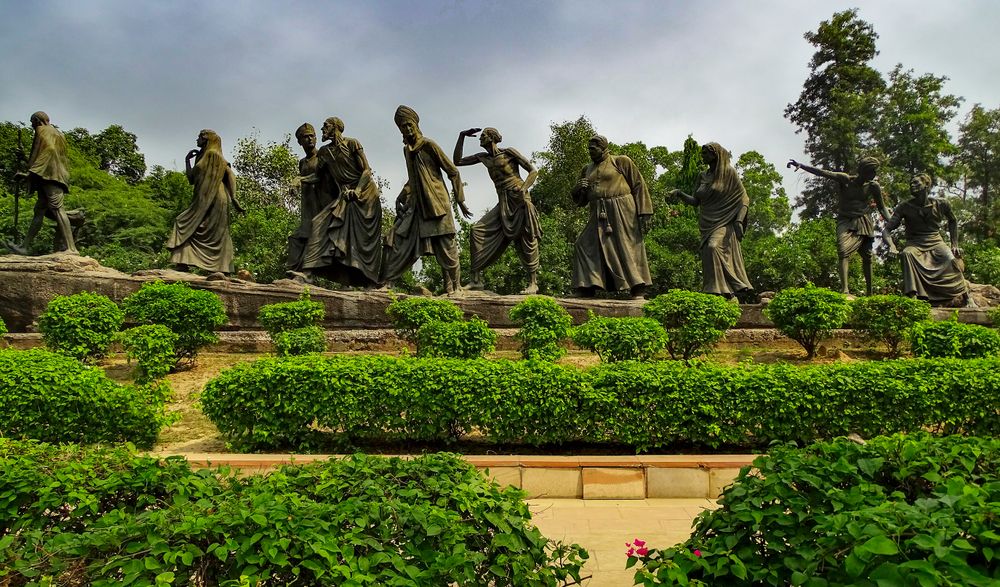
Nonviolence a historic power to defend civil rights
Nonviolence is a concept, which has its roots within religions such as Jainism, Buddhism, Hinduism, Christianity and could be defined as a philosophical and strategy way of actions and ideas to achieve social or/and political change with the rejects of violence.
Contemporary history has shown how much nonviolence is a powerful tool to accomplish changes, for instance the nonviolence resistance movements against British imperial rule in India (as the “ Salt March “ from 12 March 1930), headed in particular by spiritual and political leader Mohandas Karamchand Gandhi (commonly known as Mahatma Gandhi) which led to the independence of the country; but also the struggle against racial inequality and advocacy for civil and economic rights such as Martin Luther King’s ideas and political stances (as the “March on Washington for Jobs and Freedom” on August 28 th , 1963).
These leaders of nonviolent movements, influenced several protests and revolution afterwards such as the “flower power” slogan late 1960s, used in opposition movements to the Vietnam War; the “People power revolution” in the Philippines on February 1986 ; the “Velvet Revolution” in former Czechoslovakia, and more recently the Arab Spring on 2011.
It is clear that nonviolence allowed great changes in the past and these are still in minds even now, to encourage people facing oppression.
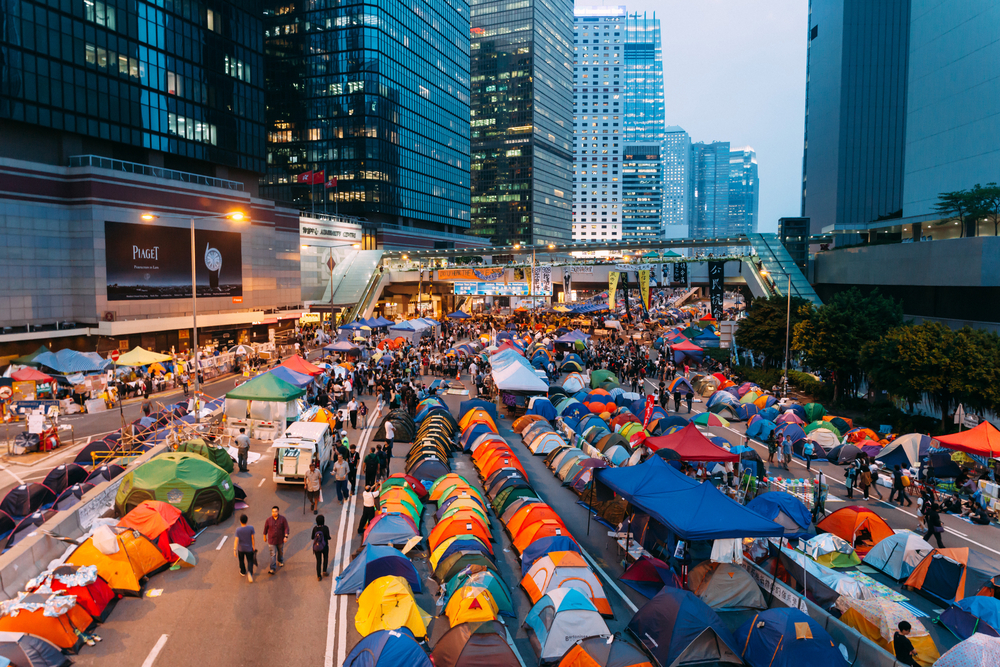
The celebration of nonviolence, an important support for oppressed people
The international day of nonviolence is essential to recall what oppressed people in the past achieved, but it is also a solid support for oppressed people, nowadays, whose still defend their rights and freedoms.
As we can see in Hong Kong, the massive protest movement in 2014, named the “Umbrella Movement“ was based on nonviolence principles to act against law enforcement violence, especially to defend themselves with umbrellas against the police’s use of pepper spray. These umbrellas became a symbol on protests still occurring in Hong Kong, as the use of hardhats today. The use of symbols and protest meetings, are part of the “198 methods of nonviolent action”, researched and catalogued by Gene Sharp (an American political scientist) in his book. (“The Politics of Nonviolent Action”, 1973).
Nowadays, nonviolence principles are the focal point of most of contemporary protests. Through human rights advocacy and local actions , Humanium is acting every day to ensure child rights are being respected. Also, people of the world are becoming the source of changes through the power of nonviolence, such as passive resistance, pacifism speech and meetings, and civil disobedience. Nonviolence has never been more important than today for us all and is of increasing importance with all the changes we are part of and see daily that come, with climate change, the exhaustion of natural resources and migrant flows that naturally follow.
Anecdote: The Salt March: an example of nonviolent civil disobedience led by Gandhi In colonial India, from 12 March 1930, Gandhi started a long walk (240 miles) to Indian Ocean coast, joined by Indians along the way, in order to make salt by evaporation near the coast. At that time, an imperial British law imposed a salt tax for all Indians consumers, even the poorest, and prohibited them to produce salt. As the numbers of Indians, joining the march, increased, and after the arrest of Gandhi, and then his release, the British rulers were forced to come to the discussion table. This event had influence through the world (it inspired Martin Luther King Jr.) and gave strength and hope for the Indian independence movement.
Written by Eddy Malouli
Bibliography
Gene Sharp. (1973). “The Politics of Nonviolent Action”. Retrieved from aeinstein.org on the 12 th september 2019: https://www.aeinstein.org/nonviolentaction/198-methods-of-nonviolent-action/
General Assembly, U. (2007, June 15). UN declares 2 October, Gandhi’s birthday, as International Day of Non-Violence . Retrieved from UN News on the 12 th september 2019 : https://news.un.org/en/story/2007/06/222502-un-declares-2-october-gandhis-birthday-international-day-non-violence
Martin Luther King Jr. (December 10, 1964). Acceptance Speech, on the occasion of the award of the Nobel Peace Prize in Oslo . Retrieved from Nobel Prize.org on the 12 th september 2019 : https://www.nobelprize.org/prizes/peace/1964/king/26142-martin-luther-king-jr-acceptance-speech-1964/
Petition to Stop the Destruction of the Amazon Rainforest

BE HEARD! Advocate for the protection of child rights by calling for an end to fires and deforestation in the Amazon Rainforest!
Social Media Menu
Textresizebutton.

- Working with ESCAP
- Capacity development
- Technical Cooperation Highlights
- South-South and Triangular Cooperation

- Knowledge Products

- Knowledge Products Series

- Data & Statistics
- Training & Learning Platform

- ESCAP Library

- Expert Opinions & Stories

- Today's Events
- UN Observances
- ESCAP Official Holidays
Language bar
Executive Secretary
International Day of Non-Violence
03 October 2022
- Website Inauguration Function.
- Vocational Placement Cell Inauguration
- Media Coverage.
- Certificate & Recommendations
- Privacy Policy
- Science Project Metric
- Social Studies 8 Class
- Computer Fundamentals
- Introduction to C++
- Programming Methodology
- Programming in C++
- Data structures
- Boolean Algebra
- Object Oriented Concepts
- Database Management Systems
- Open Source Software
- Operating System
- PHP Tutorials
- Earth Science
- Physical Science
- Sets & Functions
- Coordinate Geometry
- Mathematical Reasoning
- Statics and Probability
- Accountancy
- Business Studies
- Political Science
- English (Sr. Secondary)
Hindi (Sr. Secondary)
- Punjab (Sr. Secondary)
- Accountancy and Auditing
- Air Conditioning and Refrigeration Technology
- Automobile Technology
- Electrical Technology
- Electronics Technology
- Hotel Management and Catering Technology
- IT Application
- Marketing and Salesmanship
- Office Secretaryship
- Stenography
- Hindi Essays
- English Essays
Letter Writing
- Shorthand Dictation
Essay on “International Day of Non-Violence – October 2” Complete Essay for Class 10, Class 12 and Graduation and other classes.
International Day of Non-Violence – October 2
Mahatma Gandhi’s birth anniversary, is commemorated as Communal Harmony Day (also as Gandhi Jayanthi) throughout the country on October 2nd each year. Mahatma Gandhi devoted his entire life for propounding communal harmony.
International Day of Non-Violence
The United Nations General Assembly on l5’h June 2007 decided to observe the International Day of Non-Violence each year on 2 October — the birth anniversary of Mahatma Gandhi, who helped lead India to independence and inspired movements for civil rights and freedom across the world. This will be in recognition of his role in promoting the message of peace around the world.
The ‘International Day of Non-Violence’ will be observed for the first time on October 2 2007 after which it would become an annual affair. The UN invites all member states, NGOs and individuals to commemorate the day and disseminate the message of non-violence, “including through education and public awareness.”
Gandhiji’s “novel mode of mass mobilization and non-violent action” brought down colonialism, strengthened the roots of popular sovereignty, of civil, political and economic rights, and greatly influenced many a freedom struggle and inspired leaders like Nelson Mandela and Martin Luther King.
He wished in ‘India of his dream’, “1 shall for an India, in which the poorest shall feel that it is their country in whose making they have an effective voice; an India in which there shall be no high class and low class of people; and above all an India in which all communities shall live in perfect harmony.”
Gandhi’s political philosophy revolved around three key concepts: satyagraha (non-violence), swaraj (home rule), and sarvodaya (welfare of all). Whereas satyagraha was essentially a tactic of achieving political ends by non-violent means, swaraj and sarvodaya sought to encourage — through social work, spinning of cotton, rural uplift, and social welfare — ideas of individual and collective improvement and regeneration. Such regeneration, Gandhi insisted, was necessary if India was to rediscover her enduring historical and religious self and throw off British rule.
Non-Violence with Gandhi was not a mere concept but it was an article of faith, a condition of existence, a cultural necessity. He had goodwill even for plants and animals and insects. He often said that non-violence is meant for the bold and the brave, not for the cowards and the weak. Non-violence is meant for the strong of mind and stout of heart. Non-Violence is not a passive doctrine; it is active and dynamic. It implies conscious suffering. Non-violence was mightier than violence; it was mightier than any sword. Violence is going to be the greatest challenge of the 2P’ century and therein is the relevance of Gandhi.
In view of the growing violence in the coming years, Gandhi is most relevant. In the words of Martin Luther King “If Humanity is to progress, Gandhi is inseparable … We may ignore him at our own risk”. Gandhi is relevant wherever there is struggle for freedom, wherever there is struggle for justice, wherever there is oppression. UNESCO paid the greatest tribute to Gandhi when it adopted in its preamble the Gandhian thought that since wars begin in the minds of men, it is in the minds of men that the defenses of peace must be constructed. If the 19th century belonged to Carlyle and Ruskin and the 20th century to Russell and Huxley, the 21′ century belongs to Gandhi alone, for he said that if there was a choice between cowardice and violence he would choose the latter because non-violence is not for the cowardly or the weak.
Communal Harmony, he said, was the key to India’s progress. The Hindus, the Muslims, the Sikhs and the Christians have been living together for centuries and are bound by a common culture. He declared: All those who live here, to whatever religion they may belong are equal sharers in their common home and its great inheritance, having equal rights and obligations. Religion, he said was a personal matter between Man and his God. `Indian Culture’, he said, ‘was neither Hindu nor Muslim nor any other but a composite culture where all communities have richly contributed. On another occasion he stated that ‘we must help a Hindu to become a better Hindu, a Musalman a better Musalman and a Christian to become a better Christian We must eradicate from our mind the secret pride that our religion is more true and that of another is less so’.
Gandhi stood for a secular society, his secularism was not religious illiteracy, it meant equal respect for all religions, a strict moral and ethical code for all citizens. Every one was equal and nobody more equal.
Gandhi often said that in pursuit of non-violence and communal harmony one should reduce himself to zero. Asked as to what he meant by it, he replied; :It means to be the last in receiving good things, to serve everyone, not to expect gratitude, and to be the first in suffering. One who thus reduces himself to zero will always be absorbed in noble work’. For him working for communal harmony was the best thing Indians could do for their Motherland.
Mahatma Gandhi was born on the crossroads of our history and gave the country a purposeful direction. He made his mark as a reformer, as a thinker, and as a liberator. He was a practical idealist. His sense of observation, analysis, and experimentation even at a comparatively younger age gave him a distinctive mental quality and approach to the matters that he confronted.
In his constructive programme, he gave the first place to communal harmony among the people of different faiths. The result was the famous book, The Way to Communal Harmony, written by Gandhi himself. Of his writings and speeches, one is struck repeatedly by the passion and sincerity with which he pleaded for the cause of better understanding among individuals and communities. The book is a compilation of Gandhi’s reflections on certain problems that divide humankind. Everywhere in the world, individuals and groups are divided because of fear, suspicion, and hatred towards each other, which further depends on whether the division expressed itself along religious, economic, political, caste, or colour lines.
Whatever is the form, insecurity is perhaps the major cause of individual or social dissensions. A person, who is integrated and sure of himself, fears none and consequently provokes no fear. We have examples of such heroic individuals. But we do not have until now instances of societies or communities that are fully integrated and therefore fearless.
Gandhi felt that if Hindu-Muslim unity was established, unity with other communities that was already there could easily be strengthened. He never found serious differences between the Hindus and Muslims and other minority communities like the Christians and the Sikhs, not to speak of the small community of Parsis. Naturally, therefore, he turned to the question of Hindu-Muslim unity. He insisted that the Hindus who are in a majority in the country should help the Muslims and should never entertain any idea of enforcing their rights but try to win the hearts of the minority community.
He expressed: -“1 am striving to become the best cement between the two communities. My longing is to be able to cement the two with my blood, if necessary. There is nothing in either religion to keep the two communities apart. In nature there is a fundamentally unity running through all the diversity. Religions are no exception to the natural law. They are given to the mankind so as to accelerate the process of realization of fundamental unity. The need of the moment is not an establishment of a Universal religion but there is a greater need to develop mutual respect towards the different religions.”
The four words — truth, non-violence, sarvodaya and satyagraha — constitute Gandhi and his teaching. The first two are cardinal principles of Gandhian thought — satya and ahimsa — havebroader meaning than their English translation.
The basic principle, Truth, inspired all his thought and action. It was the realization that an inviolable harmony exists in all creation and any violation of that harmony would create disaster. He saw this principle enshrined in all religions, which led him to accord equal respect to all faiths. Vasudhaiva Kutumbakam of the Vedic tradition to him was no different from the Quranic belief that Allah the Beneficent and Merciful was the creator if all that we see and hear about and that he would dispense justice on the basis of deeds and not the professed faith of each person. Nor was it different from the Christian faith that God’s love and benediction was for all without any distinction and so on. All religions insist on equality of human race and on developing a harmonious relationship with the entirety of creation around. Any violation of the principle of equality gives way to conflict and violation.
Gandhi regards Islam as a religion of peace in the same sense as Christianity, Buddhism, and Hinduism. No doubt, there are differences in degree. He says in this regard that he knew the passages that can be quoted form the Holy book Quran to the contrary. But it is possible to quote from the Vedas to the contrary. “My reading of the Quran has convinced me that the basis of Islam is not violence but is unadulterated Peace. It regards forbearance as a superior to vengeance. The very word “Islam” means Peace, which is nonviolence. My experience of all India tells me that the Hindus and the Muslims know how to live at Peace among themselves. I decline to believe that the people have said good-bye to their senses, so as to make it impossible to live at Peace with each other, as they done for generations. The enmity cannot last forever.”
Gandhi had never accepted even in principle the theory of the Hindus and the Muslims being two distinct nations and he tried to convince both of them of the pernicious character of this principle. 1-le continued to the last day of his life to instill the lesson of unity among the communities of India.
The great leader, however, clearly saw the time coming when people belonging to different faiths will have the same regard for the other faiths that they have for their own. Just as in nature a fundamental unity running through all the existing diversity, so also in religions there is a fundamental unity, which one has to recognize and realize. In order to discover this underlying unity among all religions, Gandhi had with him a master key of Truth and nonviolence.
He stressed upon universal Peace, goodwill and reverence for all life. He emphatically stressed upon ethical teachings in school curriculum, as he believed that the fundamentals of ethics are common to all religions. The conflict of the creeds and religious recrimination, he detested most. He preached that we must eradicate from our midst the secret pride that our religion is truer than the other religions. Our attitude towards all other religions must be absolutely clear and sincere. He wanted unity of heart and mind among Hindus and Muslims. Communal harmony always received priority over other programmes.
All religions teach men to be good and peaceful. Intolerance is the religion of the negative. The Gita, the Quran, the Bible, the Granth Sahib, the Zend Avesta contain gems of wisdom, although the followers might belie their teachings. “The essence of true religious teaching is that one should serve and befriend all. I learnt this in my mother’s lap.
But it is unfortunate that after independence there have been over five thousand communal riots in India. How are we to get rid of this problem? Let us try to find solution pertaining to the problem of communalism in India. Before that, let us know and understand the meaning and definition of communalism.
It may be said that communalism is the negative aspect of the community. That is to say, when the people of a particular community care only for their own narrowly concerned interests, through the means of their religious faiths, old customs and __coliservative practices, disregarding the interests of whole society, then it may be termed as communalism.
In general, following four main things can be found in a state of communalism, 1) Negativity 2) Narrowness 3) Unfair means; and 4) Disregard to the interests of society. The unfair means that are adopted in a state of communalism, neglecting the interests of society, instigation based on religious sentiments is the main among them, which can. be observed clearly in communal violence that occurred during the last 60 years in India.
Each and everyone has to make a balance between his or her own religious community and national interests, he or she has to unite with nationalism, and then should move forward. The teachings of a religious community may be great, but the followers of the community concerned should understand that nationalism is greater. If they do not become familiar with this fact, they will be away from national stream; they will suffer. This fact relates not only to India but also to many other countries of the world.
There is a great need to work towards eradicating the problem of illiteracy, poverty and unemployment among the youths and that too with honesty and without any discrimination. This will help in solving many problems, and will create awakening. The result will be in checking on communalism largely. That is why it is expected that a lot of work has to be done at government level in this direction.
Thus, in order to get rid of the problem of communalism in India, there is a need of collective efforts. All will have to discharge their duties. If we do so, definitely harmony will prevail. Everybody will prosper. This must be done; this was the dream of Mahatma Gandhi for a free India.
Gandhi dreamed of a world without wars, a society without caste or class, factories without forced or child labour, in fact a non-violent, non-exploiting social order, where the mind is free and the head is held high. An internationalist to the core, he never lost sight of his Indian identity. “I do not want my house to be walled from all sides and windows to be stuffed. I want the cultures of all lands to blow freely in my house but I refuse to be blown off my feet by any”. Gandhi is not exclusive. He is universal. He does not belong to any particular country. He belongs to the ages.
About evirtualguru_ajaygour

Leave a Reply Cancel reply
Your email address will not be published. Required fields are marked *
Quick Links

Popular Tags
Visitors question & answer.
- Jayprakash on Hindi Essay on “Aitihasik Sthal ki Yatra” , ”ऐतिहासिक स्थल की यात्रा” Complete Hindi Essay for Class 10, Class 12 and Graduation and other classes.
- Diksha on Official Letter Example “Write a letter to Superintendent of Police for theft of your bicycle. ” Complete Official Letter for all classes.
- Anchal Sharma on Write a letter to the Postmaster complaining against the Postman of your locality.
- rrrr on Hindi Essay on “Pratahkal ki Sair” , ”प्रातःकाल की सैर ” Complete Hindi Essay for Class 10, Class 12 and Graduation and other classes.
- Mihir on CBSE ASL “Listening Test Worksheet” (ASL) 2017 for Class 11, Listening Test Audio Script 1
Download Our Educational Android Apps

Latest Desk
- Contemporary Indian Women-English Essay, Paragraph, Speech for Class 9, 10, 11 and 12 Students.
- Privatisation: Strengths and Weaknesses-English Essay, Paragraph, Speech for Class 9, 10, 11 and 12 Students.
- Greater political power alone will not improve women’s plight-English Essay, Paragraph, Speech for Class 9, 10, 11 and 12 Students.
- Casteism and Electoral Politics in India-English Essay, Paragraph, Speech for Class 9, 10, 11 and 12 Students.
- Wither Indian Democracy?-English Essay, Paragraph, Speech for Class 9, 10, 11 and 12 Students.
- Do Not Put Off till Tomorrow What You Can Do Today, Complete English Essay, Paragraph, Speech for Class 9, 10, 11, 12, Graduation and Competitive Examination.
- Shabd Shakti Ki Paribhasha aur Udahran | शब्द शक्ति की परिभाषा और उदाहरण
- Shabd Gun Ki Paribhasha aur Udahran | शब्द गुण की परिभाषा और उदाहरण
- Example Letter regarding election victory.
- Example Letter regarding the award of a Ph.D.
- Example Letter regarding the birth of a child.
- Example Letter regarding going abroad.
- Letter regarding the publishing of a Novel.

Vocational Edu.
- English Shorthand Dictation “East and Dwellings” 80 and 100 wpm Legal Matters Dictation 500 Words with Outlines.
- English Shorthand Dictation “Haryana General Sales Tax Act” 80 and 100 wpm Legal Matters Dictation 500 Words with Outlines meaning.
- English Shorthand Dictation “Deal with Export of Goods” 80 and 100 wpm Legal Matters Dictation 500 Words with Outlines meaning.
- English Shorthand Dictation “Interpreting a State Law” 80 and 100 wpm Legal Matters Dictation 500 Words with Outlines meaning.
Search form
International day of non-violence.
- [Representative of the Government of Kenya]
- Prof. Peter Mbithi, Vice Chancellor, University of Nairobi,
- Your Excellency Prof. Kivutha Kibwana, Governor, Makueni County,
- Your Excellency Amb. Ms. Suchitra Durai, High Commissioner of India,
- Excellencies, Ambassadors and High Commissioners
- Distinguished participants,
- UN Colleagues,
- Ladies and gentlemen,
I am pleased to be with you today to mark this year’s International Day of Non-Violence.
Having arrived in Nairobi just a few hours ago, this is the first public event in which I am participating as Director-General of UNON. I find this to be a very appropriate first engagement, given the close correlation between the goals of the United Nations and the ideals of Mahatma Ghandi. Indeed, the values of tolerance, peace and mutual understanding that Gandhi so ably espoused lie at the heart of the United Nations’ own mission. That is why the UN General Assembly decided, 12 years ago, to recognize 2 October, the birthday of Mahatma Ghandi, as the International Day of Non-Violence. Today, Ghandi’s teachings remain as relevant as ever, and are a powerful source of guidance as we collectively seek to create a better world for all. I now have the honour to deliver the message of the United Nations Secretary-General on the occasion of this Day, which reads as follows:
“On the International Day of Non-Violence, we recognize the enduring vision and wisdom of Mahatma Gandhi, whose birthday we also celebrate today.
At a time of protracted conflicts and complex challenges, Gandhi’s philosophy of non-violence remains an inspiration.
At the United Nations, a world free of violence -- and the resolution of differences through non-violent means -- is at the core of our work.
At a time when inequality is on the rise and a fair globalization is an imperative, we also recall Gandhi’s commitment to social justice.
And in a period when the world is striving to achieve the Sustainable Development Goals, ensure gender equality and leave no one behind, Gandhi’s commitment to human dignity can light our path.
As Gandhi once said, ‘non-violence is the greatest force at the disposal of mankind.’
The Charter of the United Nations echoes that spirit, with its call in Chapter VI for the use, ‘first of all’, of negotiation, mediation, arbitration, judicial settlement and other peaceful ways to address threats to peace. Gandhi proved that non-violence can change history.
Let us be inspired by his courage and conviction as we continue our work to advance peace, sustainable development and human rights for all of the peoples of the world.” End of quote.
I thank you for your kind attention.

Search form
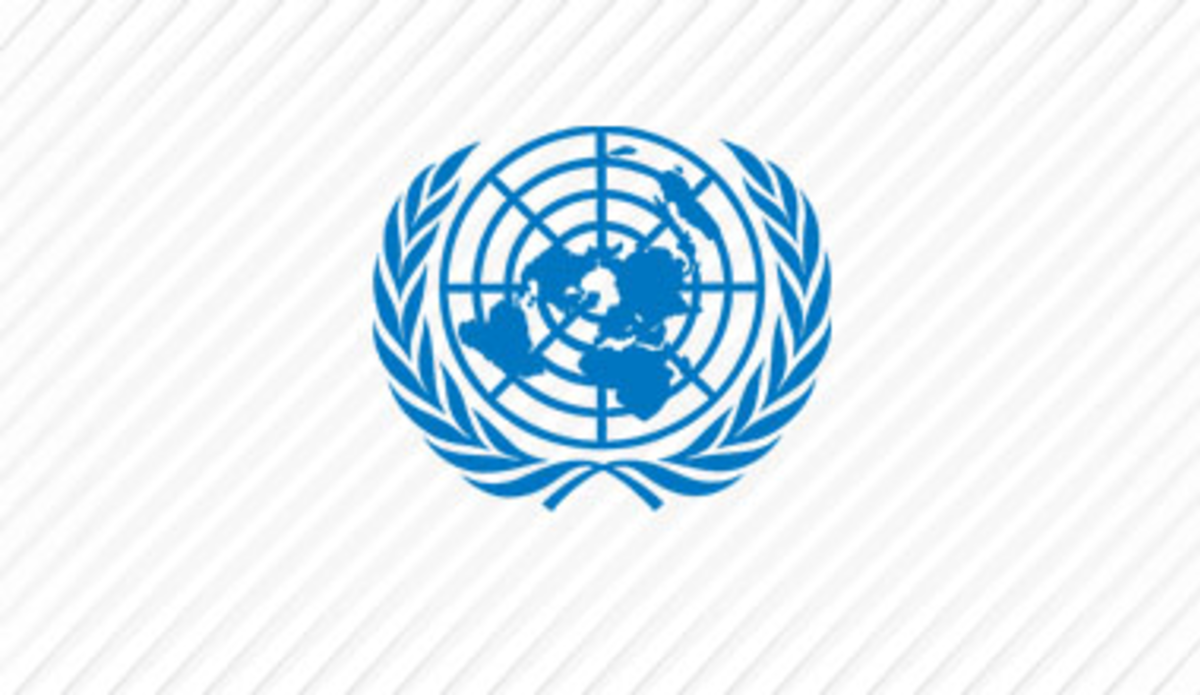
SECRETARY-GENERAL ‘S MESSAGE FOR THE INTERNATIONAL DAY OF NON-VIOLENCE
New York, 2 October 2022
The International Day of Non-Violence celebrates not only Mahatma Gandhi’s birthday, but the values he embodied that echo across the decades: peace, mutual respect, and the essential dignity shared by every person.
Sadly, our world is not living up to those values.
We see this through growing conflicts and climate chaos....
Find us on Twitter Find us on YouTube RSS feed

| Format | |
|---|---|
| BibTeX | View Download |
| MARCXML | View Download |
| TextMARC | View Download |
| MARC | View Download |
| DublinCore | View Download |
| EndNote | View Download |
| NLM | View Download |
| RefWorks | View Download |
| RIS | View Download |
Browse Subjects
- UN. General Assembly (62nd sess. : 2007-2008)
- UN. General Assembly (62nd sess. : 2007-2008) Resolutions and decisions">Resolutions and decisions
- UN. Secretary-General
- UN. Secretariat
- UN. General Assembly (63rd sess. : 2008-2009) Agenda">Agenda
- Charter of the United Nations (1945)
- International Day of Non-Violence (2 Oct.)
- NON-VIOLENCE
- INTERNATIONAL DAYS
- EDUCATION FOR PEACE
- MORAL EDUCATION
- REGIONAL ORGANIZATIONS
- NON-GOVERNMENTAL ORGANIZATIONS
- INFORMATION EXCHANGE
GK SCIENTIST
Essay on Non-Violence
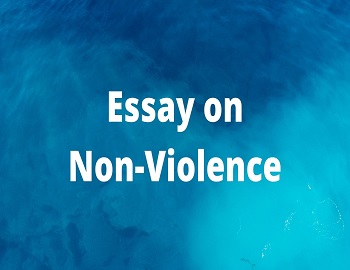
Non-Violence:
Fools mock at non-violence, wise men admire it, while great men practise it. “Non-violence”, said, Mahatma Gandhi, “is the weapon of the strong”. Under Gandhiji’s leadership, India won her freedom through the unique weapon of non-violence. Non-violence is the force of love. Believe it or not, love is a weapon stronger than the atom bomb.
Non-violence is an old doctrine. In the East as well as West non-violence as an article of faith, or philosophy of life, has been practised from time immemorial. The middle ages, for whatever reason, have been unusually violent. The last, two centuries, namely, 18th and 19th, have been periods of aggressive wars and unashamed imperialism. In the din and bustle of selfish wranglings, a man had nearly forgotten himself; he had come very dangerously near believing in the superiority of material and dark forces. Suddenly, as if it were the will of God, a man arose out of the mist and darkness of confusion, braved his frail, puny figure against the demon of tyranny and physical pride. He fought over fifty years, battled and struggled, and finally proved the triumph of spirit over matter. That man was Mahatma Gandhi, who harked back mankind to the call of reason and courageous faith.
What is non-violence? Volumes may be written on it. Volumes have been written. The principle enshrined in the preachings of Zoroaster, Mahavir, Buddha, Jesus, Nanak, etc. has been re-stated by Mahatma Gandhi. It was in South Africa that the great seer experimented with the truth. It was he who had first revolted against the British racial pride and maltreatment of the Indians. He exposed himself to great risk of life, took upon himself, calmly and spiritedly, all indignities to awaken the conscience and good faith. Non-violence, therefore, according to him who is the greatest philosopher of non-violence is Ahimsa, that is, showing of good-will and love to an antagonist while protesting in spirit against his unjust, violent or immoral act. It was tested once again at Noakhali and finally in the prayer ground of Delhi where a mad man’s three bullets, at last, brought his mortal body low, but not the immortal spirit.
Many people do not seem to know the exact meaning of the word ‘non-violence’. They are confused.
It is true that the barest sense in which it is used is the showing of regard for others physical well-being or safety. Avoidance of physical force or avoidance of inflicting pain, torture or death on others is the first article of non-violence. The other aspect of it is of greater significance. That aspect implies an attitude of life in which a man is asked to be morally self-conscious and to be ready to undergo any trial or hardship for the sake of truth. Considered in this sense, non-violence is the creed of moral courage- the courage that rational man must bring to bear in his dealings with his kind, calm, stoic courage in which he must resist the evil of his adversary, without doing him physical violence. Obviously, non-violence is fundamentally based on the spirituality of man…..and deeply grounded in the belief that given a suitable opportunity, the conscience of man which is good and moral, is bound to prevail.
Is non-violence the creed of the strong? or is it a shrewd cover over the coward to avoid the risks of physical hardship? In his experiment with truth at Noakhali, when the fire and dust of communal hatred had clouded human judgement, Mahatma Gandhi braved his puny, frail figure through ranks of hostile, mad men to teach them that non-violence was not the religion of the coward but of the strong and the morally determined. Lest someone should make his faith for shrewd cowardice, he once went so far to say that it is any day better to go down fighting bravely against evil rather than tamely to submit to it under the cover of Ahimsa. When women’s honour and chastity were in danger at the hands of ruffians, the Mahatma’s formula of non-violence suddenly changed its front, and out it went from tame, passive self-surrendered to spirited and violent self-defence. Non-violence then, as understood by its greatest preacher of modern times, is not passive and cowardly self-surrender, but spirited and determined resistance to evil in utter good faith. Non-violence had its greatest apostle in Christ and Buddha. Buddha propagated a faith that gave to the world a great religion and a great emperor (Ashoka).
Christ died on the cross so that proud Pharisees might learn that in the spirit of men there is no distinction. “Could it be possible,” asks Dr Rajendra Prasad, “that nation knowing full well the destructive potentialities of the atom bomb, would still continue to spend billions on the manufacture of the bombs? The sages of our land for this reason emphatically declared that self-conquest is the supreme triumph of man. More than 2,000 years ago the great emperor Ashoka renounced all conquest except the Dharma Vijay. Mahatma Gandhi has been again giving this message to the people of India and the world. Dazzled by the glitter of modern civilization, deafened by the maddening noise of the modern machine, we miss the music of the moral law”.
Is non-violence synonymous with moral courage? Yes, It is equivalent to moral courage, plus something more. “This something more is what makes the creed of non-violence practical, creative and active. Gandhian non-violence is a Hebraic attitude of life. It seeks to leave the world a little better than what we found it. It seeks to interfere in the affairs of others, in the interests of truth and justice. It is no mere passive or stoic moral courage- but the active, driving force of a spirit to seek redress of moral grievances”.
“My non-violence,” says Mahatma Gandhi, “does not admit of running away from danger, and leaving near and dear ones unprotected. Between violence and cowardly flight, I can only prefer violence to cowardice. Non-violence is the summit of braver”. It is the brave man’s courage to defy without injuring the other, Or better still, as Dr B. C. Roy puts it, “A non-violent man gives patient hearing to his opponent, reasons with him respectfully, and if need be combats enemies by non-violent resistance. In dealing with men, particularly those of different cult or way of thinking, he does not injure them, but endures injury himself, serves them without fear of unnaturalness, and turns the non-violent non-cooperation technique to success”.
Rightly said Pandit Jawaharlal Nehru, Gandhiji’s greatest disciple, “This war and the events preceding it has impressed upon me more than ever the futility of violence”. In the hour of the gravest provocation when the Eastern Pakistan affairs were wearing out the last supports of India’s patience when the hisses of an impending war between the two states were fast mounting on to a dangerous climax, Pandit Nehru, on the eve of the Nehru-Liaquat Agreement, advised calm and sober reason on both sides and rightly summed up the basic philosophy of India’s non-violent creed, which, far from being one of cowardly compromise, was founded on moral courage and faith in truth and justice. He said, “If we now adopt a policy of war, we will not only go back on all for which we have stood during the past 30 years but would also lower our prestige. No sensible man can, therefore talk of dragging his country into war. But if in spite of us, it id forced on us, we will fight. That is why we maintain an army and an air force”.
| – NIOS |
Related Posts

Essay on “A Visit to a Village”
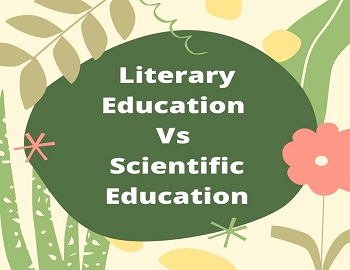
Essay on Literary Education Vs Scientific Education
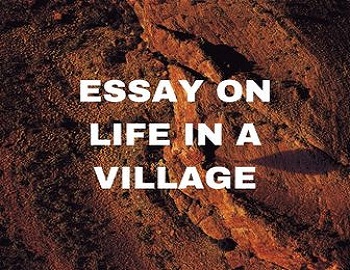
Essay on Life in a Village

Essay on Hostel Life
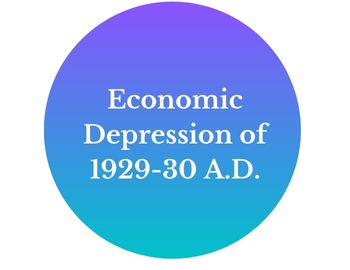
Essay on the Economic Depression of 1929-30 A.D.
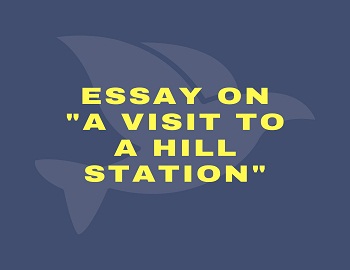
Essay on “A Visit to a Hill Station”
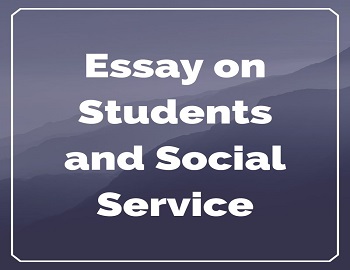
Essay on Students and Social Service
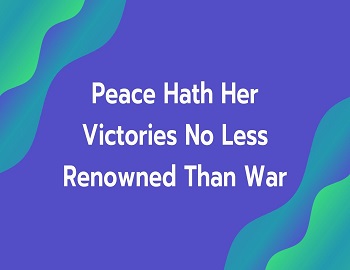
Essay on Peace Hath Her Victories No Less Renowned Than War
Comments (no), leave a reply cancel reply.
Save my name, email, and website in this browser for the next time I comment.

Search the United Nations
- Global Events
- UN Observances
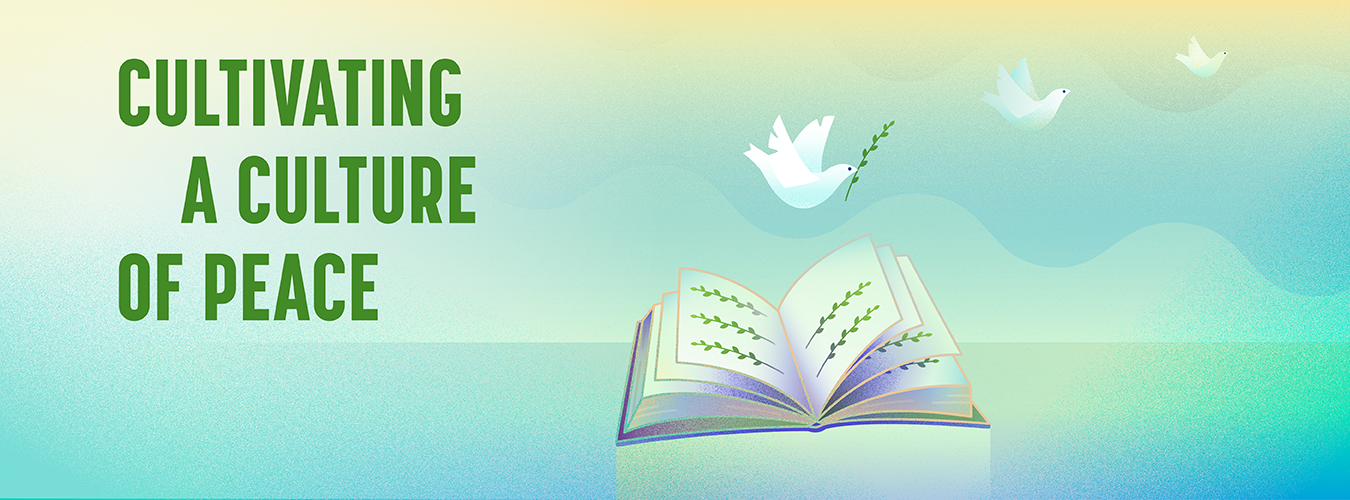
... UN Secretary-General António Guterres

2024 Theme: Cultivating a Culture of Peace
This year marks the 25th anniversary of the United Nations General Assembly’s adoption of the Declaration and Programme of Action on a Culture of Peace .
In that declaration, the United Nations’ most inclusive body recognized that peace “not only is the absence of conflict, but also requires a positive, dynamic participatory process where dialogue is encouraged and conflicts are solved in a spirit of mutual understanding and cooperation.”
In a world with rising geopolitical tensions and protracted conflicts, there has never been a better time to remember how the UN General Assembly came together in 1999 to lay out the values needed for a culture of peace. These include: respect for life, human rights and fundamental freedoms; the promotion of non-violence through education, dialogue and cooperation; commitment to peaceful settlement of conflicts; and adherence to freedom, justice, democracy, tolerance, solidarity, cooperation, pluralism, cultural diversity, dialogue and understanding at all levels of society and among nations.
In follow-up resolutions, the General Assembly recognized further the importance of choosing negotiations over confrontation and of working together and not against each other.
The Constitution of the United Nations Educational, Scientific and Cultural Organization ( UNESCO ) starts with the notion that “wars begin in the minds of men so it is in the minds of men that the defences of peace must be constructed”. It is this notion that framed the theme and logo of this year’s observance of the International Day of Peace. The ideas of peace, the culture of peace, need to be cultivated in the minds of children and communities through formal and informal education, across countries and generations.
The International Day of Peace has always been a time to lay down weapons and observe ceasefires. But it now must also be a time for people to see each other’s humanity. Our survival as a global community depends on that.
The International Day of Peace was established in 1981 by the United Nations General Assembly. Two decades later, in 2001, the General Assembly unanimously voted to designate the Day as a period of non-violence and cease-fire.
2023 Events
Peace bell ceremony - international day of peace 13 september, 10:00-10:30 a.m. est.
This year, the traditional Peace Bell Ceremony took place on Wednesday, 13 September. Remarks were delivered by the Secretary-General and the President of the General Assembly , and the event was livestreamed on UN Web TV . Watch the Peace Bell Ceremony .
Youth Event - International Day of Peace 14 September, 9:30 a.m. - 12:00 p.m. EST
Video with highlights of the youth event Programme Watch the full event on YouTube Watch the full event on UN Web TV
This year, the International Day of Peace Youth Event was livestreamed on UN Web TV and UN YouTube on 14 September. The event provided a platform for young people to showcase the actions they have taken, or commit to an action they will take, in their schools and communities to help accelerate progress towards achieving the SDGs and thereby fostering peace .
Read an interview in Africa Renewal with Florence Otedola, popularly known as DJ Cuppy, who spoke at the event.
Get Involved!
Act for our common future.

Embrace the possible. That’s the call of the 17 Sustainable Development Goals , a blueprint for a better world. We don’t have to wait for the future we want—we can create it right now. Everyone can join the global movement for change.
ActNow is the United Nations campaign to inspire people to act for the Sustainable Development Goals.
The time is now to UNITE TO ACT!
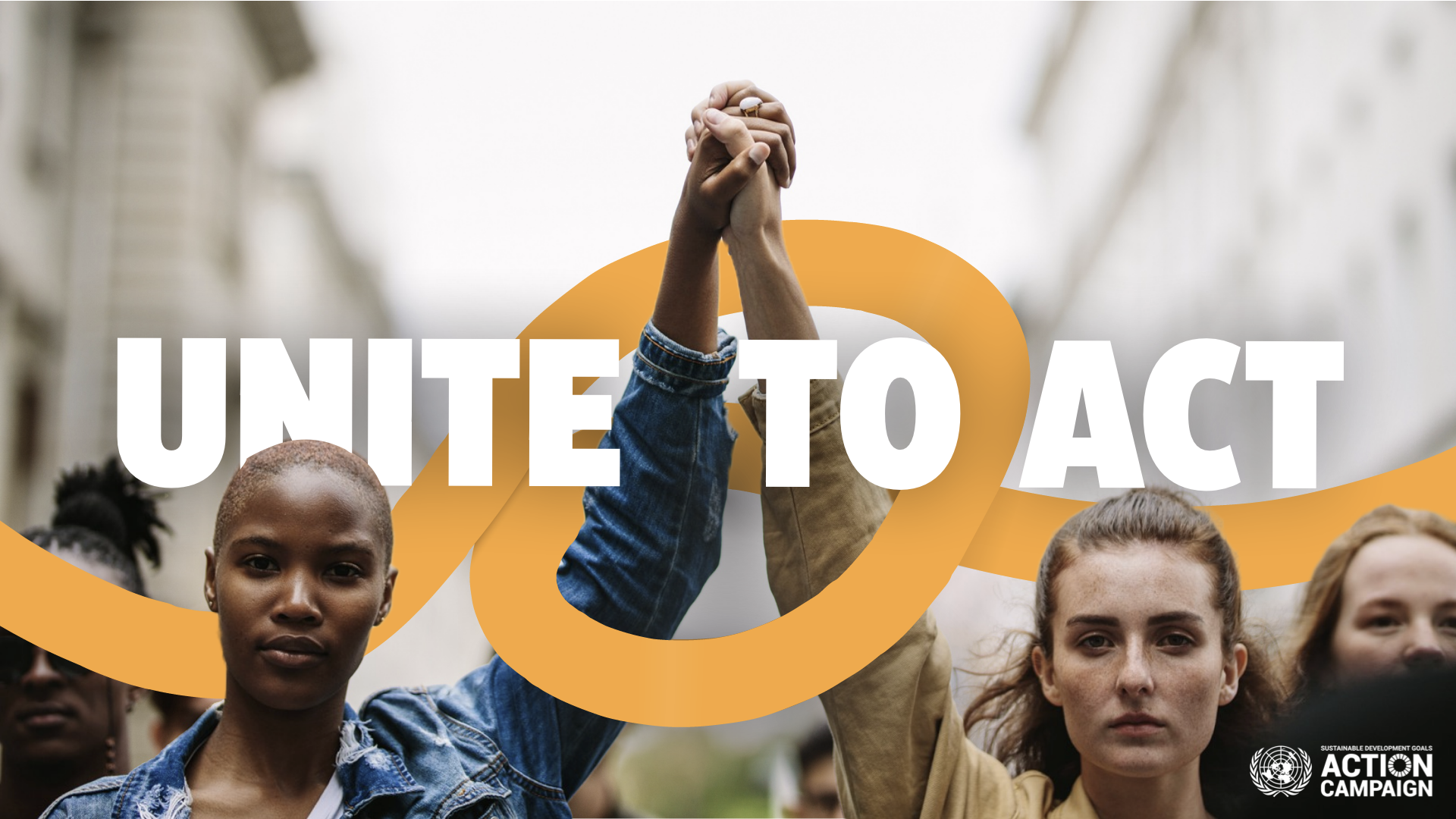
Unity is at the heart of the SDGs because achieving any single goal requires achieving them all. And this is only possible when people themselves unite for change to give humanity and our planet a beautiful, sustainable future.
We are stronger together, united in action. Register your action today and UNITE TO #Act4SDGs
History of the Culture of Peace
Related observances
- International Day of Conscience
- International Day of Sport for Development and Peace
- International Day of Multilateralism and Diplomacy for Peace
- International Day of Living Together in Peace
- International Day of UN Peacekeepers
- International Day of Non-Violence
- World Science Day for Peace and Development
- International Day of Neutrality
Related links
- Remarks by General Assembly President Dennis Francis at the High-Level Forum on a Culture of Peace ( video )
- UN and the Olympic Truce

Preventative Diplomacy for Peace
The Secretary-General’s vision for centering the Organization’s work on peace and security around prevention and through a surge in diplomacy for peace reaffirms the United Nations' founding mission. Since its inception, the UN has played a crucial role in helping to mediate conflicts at all stages: before they escalate into armed conflict, after the outbreak of violence, and during the implementation of peace agreements. UN peacemaking flourished in the decade following the end of the Cold War and the Organization continues to play a preeminent role in this field.
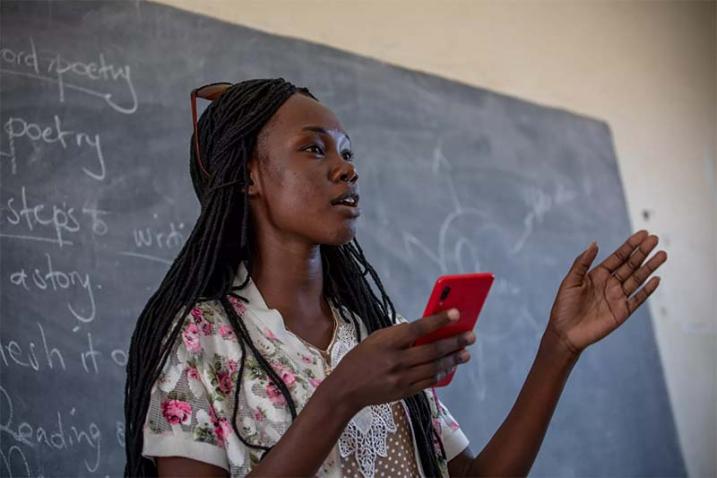
Poems for Peace
Around the world, millions of children are growing up in conflict. They are often uprooted from home or exposed to extreme trauma. With Poems for Peace , UNICEF gives children a platform to explain in their own words the impact of conflict and war on their lives – and their hopes and dreams for the future. By amplifying the voices of children, UNICEF is highlighting the extraordinary strength and courage of young people longing for a more stable future.

Why do we mark International Days?
International days and weeks are occasions to educate the public on issues of concern, to mobilize political will and resources to address global problems, and to celebrate and reinforce achievements of humanity. The existence of international days predates the establishment of the United Nations, but the UN has embraced them as a powerful advocacy tool. We also mark other UN observances .

COMMENTS
The International Day of Non-Violence is observed on 2 October, the birthday of Mahatma Gandhi, leader of the Indian independence movement and pioneer of the philosophy and strategy of non ...
International Day of Non Violence . The very mention of non-violence reminds us of Mahatma Gandhi and his 'weapon' of non-violence. He showed us the way to independence through non-violence. His idea or principle of non-violence is relevant even today and we are proud that it has caught the attention of many people all over the world.
International Day of Non-Violence is observed on 2 October, the birthday of Mahatma Gandhi.It was established on 15 June 2007 according to United Nations General Assembly resolution A/RES/61/271. The day is an occasion to "disseminate the message of non-violence...through education and public awareness...and reaffirm the desire for a culture of peace, tolerance, understanding and non-violence ...
Essay on Gandhi Jayanti for Students. Gandhi Jayanti is a special day celebrated in India every year on October 2nd to honor the birthday of Mahatma Gandhi. It was officially announced as one of India's national holidays, and the UN General Assembly declared it as the International Day of Non-Violence. People remember and honor Mahatma Gandhi ...
New-York, 2 October 2020 In marking the birthday of Mahatma Gandhi, this International Day highlights the remarkable power of non-violence and peaceful protest. It also a timely reminder to strive to uphold values that Gandhi lived by: the promotion of dignity, equal protection for all, and communities living together in peace. On this year's observance, we have a special
In order to remind the importance of nonviolence and to disseminate its message, including through education and public awareness, the UN General Assembly voted to establish 2 October, date of Gandhi's birthday, as the International Day of Nonviolence (General Assembly, 2007). Humanium is committed to celebrate this day and to recall the power of nonviolence through human rights and beyond.
On this International Day of Non-Violence, let us heed Gandhi's message of peace, and get down to the business of building a better and more peaceful future for all.". End quote. Excellencies, distinguished guests, On this day, we recognize the enduring vision and wisdom of Mahatma Gandhi - pioneer of the philosophy and strategy of non ...
Fifteen years ago, the United Nations General Assembly expressed its desire to "secure a culture of peace, tolerance, understanding and non-violence." Those were the words the Assembly used in 2007 in adopting the resolution that established 2 October, the birthday of Mahatma Gandhi, as the International Day of Non-Violence.
International Day of Non-Violence. 02 October 2023. On this International Day of Non-Violence, we commemorate not only the birth of Mahatma Gandhi but also the timeless values he championed: mutual respect and understanding, justice, and the power of peaceful action. Our world confronts grave challenges: growing inequalities, rising tensions ...
New York, 2 October 2021 It is no coincidence that we mark the International Day of Non-Violence on the birthday of Mahatma Gandhi. For Gandhi, non-violence, peaceful protest, dignity and equality were more than words. They represented a guiding light for humanity, a map to a better future. They also provide a template to address...
The 'International Day of Non-Violence' will be observed for the first time on October 2 2007 after which it would become an annual affair. The UN invites all member states, NGOs and individuals to commemorate the day and disseminate the message of non-violence, "including through education and public awareness."
Nonviolence means avoiding not only external physical violence but also internal violence of spirit. You not only refuse to shoot a man, but you refuse to hate him. -Dr. Martin Luther King, Jr. Nonviolence is both a principle and a practice. The principle of nonviolence affirms the active use of non-coercive and non-aggressive means to create a ...
That is why the UN General Assembly decided, 12 years ago, to recognize 2 October, the birthday of Mahatma Ghandi, as the International Day of Non-Violence. Today, Ghandi's teachings remain as relevant as ever, and are a powerful source of guidance as we collectively seek to create a better world for all. I now have the honour to deliver the ...
Secretary General's message - 2023. On this International Day of Non-Violence, we commemorate not only the birth of Mahatma Gandhi but also the timeless values he championed: mutual respect and ...
New York, 2 October 2022 The International Day of Non-Violence celebrates not only Mahatma Gandhi's birthday, but the values he embodied that echo across the decades: peace, mutual respect, and the essential dignity shared by every person. Sadly, our world is not living up to those values. We see this through growing conflicts and climate chaos....
👇Visit Website To Read https://silentcourse.com/👇Playlist : English Essay https://youtube.com/playlist?list=PL-qmYDt5YXJvdiRhzluKNcEZwjsB_Q5eB👇Playlist ...
Access English: A_RES_61_271-EN - PDF; Español: A_RES_61_271-ES - PDF; Français: ... Summary. Decides to observe the International Day of Non-Violence on 2 Oct. each year, with the International Day; invites all Member States, organizations of the UN system, regional and non-governmental organizations and individuals to commemorate the ...
Statement by H.E. Tijjani Muhammad-Bande, President of the General Assembly - International Day of Non-Violence: "Climate Action: Gandhian Ways"
Essay on International Day of Non-Violence in English in 100 words. The International Day of Non-Violence is celebrated every year on 2nd October to mark the birthday of Mahatma Gandhi, a prominent advocate of non-violent resistance. The day emphasizes the power of peaceful media to bring about positive change in the world.
Non-violence is the force of love. Believe it or not, love is a weapon stronger than the atom bomb. Non-violence is an old doctrine. In the East as well as West non-violence as an article of faith, or philosophy of life, has been practised from time immemorial. The middle ages, for whatever reason, have been unusually violent.
#studyskills #Internationaldayofnonviolence 10 Lines on International Day of Non Violence in English| Essay on International Day of Non Violence| Short Essay...
The International Day of Peace was established in 1981 by the United Nations General Assembly. Two decades later, in 2001, the General Assembly unanimously voted to designate the Day as a period ...
On this International Day of the Victims of Enforced Disappearances, the Special Representative of the Secretary-General (SRSG) and Head of UNMIK, Caroline Ziadeh, stands together with the families of the missing persons who remain unaccounted for from the conflict.